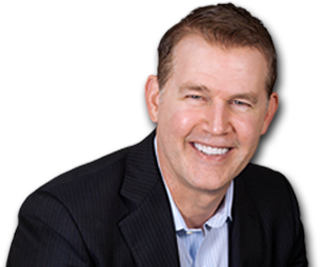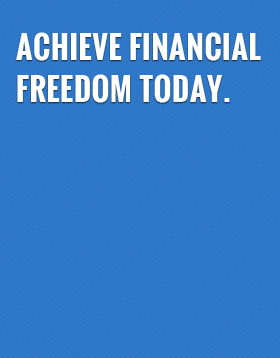One of the great universal mysteries: Why doesn’t everyone take common sense financial advice? Think back (maybe even as far as last week). At some point, you may have rolled your eyes at something you read or heard about personal finance that was just simple advice – and, in turn, you rolled the dice in some of your own personal finance decisions.
From my discussions with those seeking financial freedom and the comments left on this blog, it is clear that most people know the simple, easy things they need to do, they just don’t do them. As my mentor Jim Rohn said, “What is easy to do is easy not to do.”
Why do the easy things get left undone? One reason is because they are so-o-o-o easy not to do—to neglect, to procrastinate, to promise ourselves that we will do it tomorrow.
But another, and maybe more important reason, could be the fact that when the little things are looked at individually, we don’t value their importance. Napoleon Hill said, “A big success is made up from a great number of little circumstances each of which may seem so small and insignificant most people pass them by as not being worthy of notice.”
With that profound statement as a backdrop, here is some common sense financial advice, that most people ignore…and later regret ignoring:
Spend less than you earn. Spending less than you earn is, in other words, living below your means. This is referred to as “The Gap.” The Gap is just the difference between what you spend and what you earn. If your lifestyle expenses are too high, it’s possible to live paycheck-to-paycheck even on a six-figure salary. The wider the gap, the better off you’ll be, financially. Earning more goes a long way in widening that gap, but spending less than you earn is key. Key point to remember: Widen the gap and you widen your wealth.
There are no shortcuts. If someone tells you they can double your money quickly, tell them you already know how. Then fold your money in half and put it back in your wallet. Risk and reward are correlated. Doubling your money in a short period of time equates to a high return on your investment; that corresponds to taking-on an equal amount of risk. There’s nothing wrong with taking appropriate risk, but buying into an investment with those kinds of unrealistic promises is sure to disappoint. Key point to remember: Stop wasting time and energy looking for a shortcut. Just get busy and do the work.
Have a financial plan. Creating a budget and coming up with a financial plan go hand-in-hand. A plan with financial goals gives you something to strive for, and it puts you in charge. Even if your goal is getting out of debt—at least you’re working toward something. Money doesn’t buy happiness, but it does afford options. If you want to do something that requires money, having a plan in place will help keep you on track and motivated. Also, don’t wait until you start making more money to start budgeting. It’s critical to know exactly where your money goes, whether it is a large or small sum. Key point to remember: Having a plan gives you a purpose for saving, budgeting and living below your means.
Don’t borrow from your 401K. It’s your money, right? So why not dip into your 401K if you really need cash? There are actually a few good reasons not to “borrow” from this fund. First, you’ll pay taxes on what you take – not just once, but twice: once when you borrow from your 401k, and again when you retire and withdraw the funds. That’s not the only reason to be wary of borrowing, though: 401k loans usually have to be paid back within a few years, and if you change jobs or get laid off, you have to pay them back immediately. Key point to remember: Yes, it’s “your money” but don’t steal from yourself. It’s for your retirement, so leave it alone.
If you can’t pay cash, you can’t afford it. I hear this often: “If I can afford the monthly payments, it’s okay to finance.” No, it’s really not. If you can’t pay cash for an item, you can’t afford it – and you can’t afford to pay interest on it, either. Credit cards and loans can be a way for some people to “suspend reality”, to have the things they think symbolize wealth but in reality only make them poorer when they’ve finally paid for it and the associated interest. Credit cards are a way for banks to make money from you. It’s not real money. Key point to remember: Pay cash, or save up until you can purchase it outright. Bonus: Never finance luxury. Never.
You should keep driving your old car, long after it is paid off. If you’ve got a clunker that costs thousands of dollars in repairs every few months, then yes, by all means, it may be time to consider a trade in. But if your older vehicle is reliable and free of major issues, you may be able to save more by hanging on to it. With routine maintenance, it’s entirely possible to keep an older car in good working condition. And if you or someone in your household is handy, you can save a lot of money by doing minor repairs and maintenance work yourself. Also, consider that an older car is usually cheaper to insure. Key point to remember: Cars depreciate and quickly. Reverse the math so that the equation works in your favor. Take what you were paying as a monthly payment and put it towards savings.
Automate your savings. Automate your savings so you don’t have the opportunity to weigh whether or not you really can save that amount this month. Saving regularly through your 401K at work and toward your emergency fund and investment capital fund are fundamentals of good financial health. Don’t let money just pile-up in your checking account. Put that money away. It keeps the money from evaporating, and it gives you a psychological boost by seeing your savings grow. Key point to remember: Money should always have a purpose, a place to go and either be there or on it’s way there. Idle money will tempt you in a thousand ways.
Contribute the maximum to retirement. It’s so important and so many people choose not to do this. You should always contribute as much as you can, especially if your employer matches even just a little of your retirement contributions. It is free money. I’ll say that again, it’s free money. There is nothing in life better than free money, especially when you feel you’re probably underpaid to begin with. Also, funds in retirement accounts grow tax-free which means your money compounds faster. Make the maximum designations in your retirement plan today and adjust to living on a little less. In no time, these funds will get large and be your retirement nest egg. Key point to remember: There is no material thing today worth more than your peace of mind and comfort in the future. Nothing.
Setup an emergency fund. Having at least $1,000 in an emergency fund is imperative to your financial health, because you honestly never know what you will have to deal with. Imagine not having the funds to repair a damaged vehicle, or to save the life of your cat that was attacked by the dog you adopted, or to pay for a new washer and dryer when yours finally break after 10 glorious years the week after Christmas when you have a family of 6. Imagine not having money for those unplanned events. Where would the money most likely come from? From high-interest credit cards that sink people financially for years. Key point to remember: Things happen and sometimes happen all at once. Nobody accidentally falls into credit card debt. It’s usually the result of not having a fund to use in case of emergencies. Be prepared.
If you want to achieve more in your life, if you want to grow as a person and achieve your personal best, then you MUST become a person who does the little things that are both easy to do and easy not to do. This will likely be the greatest challenge you will ever take on, but if you will commit to this challenge and use your personal initiative do the things you know you should do with consistency, your life can be transformed.
One of the most important keys to success is having the discipline to do what you know you should do even when you don’t feel like doing it.
Be free. Nothing else is worth it.
Infographic: Can You Retire On A Million Dollars?
Infographic: How To Destroy Holiday Credit Card Debt




